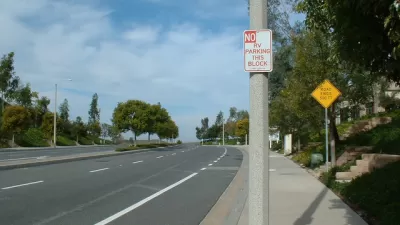Martha Bridegam investigates the aftermath of a forced eviction at a homeless encampment in San Francisco. Do the homeless deserve to be criminalized?
In what has become something of a business-as-usual approach to chronic homelessness, authorities in San Francisco broke up a community of campers residing under a freeway ramp last August.
It was what Kevin Fagan of the San Francisco Chronicle described as "a sprawling mini-city of tents, suitcases and makeshift Conestoga wagon-style trailers, and a 50-strong homeless population that had been there for years. It was the biggest street camp in San Francisco." And while the community was given 72 hours' notice to vacate, those who refused had many of their personal belongings confiscated and destroyed.
As Bridegam points out, the effort has not done much to remediate the problem, either for the residents of the camp or the surrounding neighborhood. "After the raid the camp re-formed, but smaller and under heavier weekly harassment."
"I think our officials justify clearances of camps, and conventionally housed neighbours accept them, out of civic perfectionism. They presume informal housing can't really be necessary, not in the prosperous United States. Taking comfort from the existence of government and NGO services for homeless people, they assume these services can meet all homeless people's needs — hence that informal housing is a choice made by people who refuse to be helped."
But homelessness is a complex and varied problem, short-term for some, chronic for others. And the sheer volume, the untold millions of Americans that endure long nights of harsh conditions and police harrassment is evidence enough for Bridegam that "they can't all be suffering defects of character or logic. For them, informal housing must be the best bad deal available."
Instead, Bridegam advocates a more cooperative, constructive perspective. "It's a circular problem: there will always be complaints about crime and sanitation at an informal community if authorities approach these problems not as governance and civil engineering challenges common to every human settlement but as proof that the camp must be removed."
"Although unauthorised settlements have legitimacy problems everywhere, it's inspiring to consider that in some parts of the developing world, informally housed people count as 'residents'" and, by extension, neighbors.
FULL STORY: In defence of America's informal settlements: the campers of San Francisco

Alabama: Trump Terminates Settlements for Black Communities Harmed By Raw Sewage
Trump deemed the landmark civil rights agreement “illegal DEI and environmental justice policy.”

Planetizen Federal Action Tracker
A weekly monitor of how Trump’s orders and actions are impacting planners and planning in America.

How Atlanta Built 7,000 Housing Units in 3 Years
The city’s comprehensive, neighborhood-focused housing strategy focuses on identifying properties and land that can be repurposed for housing and encouraging development in underserved neighborhoods.

In Both Crashes and Crime, Public Transportation is Far Safer than Driving
Contrary to popular assumptions, public transportation has far lower crash and crime rates than automobile travel. For safer communities, improve and encourage transit travel.

Report: Zoning Reforms Should Complement Nashville’s Ambitious Transit Plan
Without reform, restrictive zoning codes will limit the impact of the city’s planned transit expansion and could exclude some of the residents who depend on transit the most.

Judge Orders Release of Frozen IRA, IIJA Funding
The decision is a victory for environmental groups who charged that freezing funds for critical infrastructure and disaster response programs caused “real and irreparable harm” to communities.
Urban Design for Planners 1: Software Tools
This six-course series explores essential urban design concepts using open source software and equips planners with the tools they need to participate fully in the urban design process.
Planning for Universal Design
Learn the tools for implementing Universal Design in planning regulations.
Jessamine County Fiscal Court
Caltrans
Institute for Housing and Urban Development Studies (IHS)
City of Grandview
Harvard GSD Executive Education
Toledo-Lucas County Plan Commissions
Salt Lake City
NYU Wagner Graduate School of Public Service





























